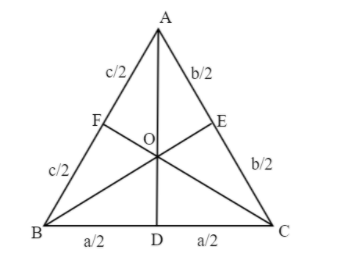Question
Question: If f, g, and h are the lengths of the perpendicular from the circumcentre of triangle ABC on the sid...
If f, g, and h are the lengths of the perpendicular from the circumcentre of triangle ABC on the sides a, b and c respectively. Prove that fa+gb+hc=41fghabc.
Solution
We’ll initiate our solution using the theorem, the angle made at the circumcentre is double the angle of the remaining vertex. Then we’ll use the famous trigonometric identity tanA+tanB+tanC=tanAtanBtanC to get the solution.
Complete step-by-step answer :
First of all, we’ll draw the diagram for a better understanding of the question batter.

O is our circumcentre in the triangle.
Now, observe in the triangle OBD, OD is the given length f.
We need to somehow get fa so let’s consider, tanA. One might think why tanA so it's because we knew that the angle made at the circumcentre is double the angle of the remaining vertex.
Now, tanA=2fa
So, fa=2tanA−−−−(1)
Similarly, tanB=2gb , which is nothing but gb=2tanB−−−−(2)
And, in the end, tanC=2hc
So, hc=2tanC−−−(3)
Keep this in mind, we have to prove that fa+gb+hc=41fghabc
And we have got the value of fa,gb, and hc. By using them
fa+gb+hc=2tanA+2tanB+2tanC ⇒fa+gb+hc=2(tanA+tanB+tanC)
Here, we know that, tanA+tanB+tanC=tanAtanBtanC
Using this trigonometric identity
fa+gb+hc=2(tanA+tanB+tanC) ⇒fa+gb+hc=2(tanAtanBtanC) ⇒fa+gb+hc=2(2fa×2gb×2hc) ⇒fa+gb+hc=2(8fghabc) ⇒fa+gb+hc=41fghabc
Hence proved.
Note : Those who are interested in tanA+tanB+tanC=tanAtanBtanC for any triangle, can prove this in the following way. In the triangle, we know, ∠A+∠B+∠C=π. Taking C to the right-hand side and then tab both sides we’ll get
tan(A+B)=tan(π−C) ⇒1−tanAtanBtanA+tanB=−tanC ⇒tanA+tanB=−tanC+tanAtanBtanC ⇒tanA+tanB+tanC=tanAtanBtanC
